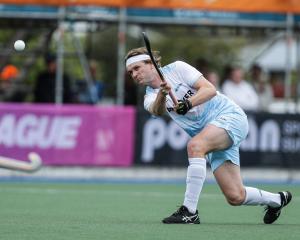Southern's decision to pull out of the National Hockey League this season has "sharpened'' New Zealand Hockey's resolve to build a sustainable tournament.
Southern announced it was pulling out of the tournament via a social website earlier this week but, inexplicably, refused to explain why.
The Otago Daily Times understands the decision was influenced by financial concerns.
New Zealand Hockey high performance director Terry Evans said Southern had indicated "some time ago'' it had some issues "they were working through'' around "resources and coaches''.
"It is obviously not ideal,'' Evans said.
"One of the things we pride ourselves on is providing participants an opportunity from any part of the country to progress right through to the highest level.
"Southern [men] were runners-up and pretty unlucky not to win the national title [last year], so for a team to go from that to out of the national competition in a short period of time is not where we want to be.''
Southern's departure has raised concerns about whether the tournament is sustainable. Veteran Southern defender James Nation revealed players pay about $1000 each to participate in the competition and Evans acknowledged NZH has "some work to do in that space''.
"This decision by Southern has sharpened our resolve and highlights some of those deficiencies that we really need to start focusing on.
"There is no doubt the regions have to contribute significantly to support the NHL. We consider that an investment in their sport but what we are working to do, within a range of competitions, is to develop a model of self-sustainability rather than individual contributors or even athlete contributions, which is significant at the moment.
"We acknowledge we are a way off that at the moment but that is the ultimate model.''
Asked if Southern had approached NZH for help fielding teams, Evans said he had not been privy to the conversations between NZH chief executive Ian Francis and Southern. Francis is on leave and could not be contacted for comment.
However, Evans said the issue around coaches was a familiar theme.
"It is something we are working towards resolving at a national level - to make sure we have quality coaches available and accessible to every region.''
With Southern's absence, the men's and women's tournaments will drop from eight to seven teams creating a bye.
The format will remain the same, though. There will still be a home-and-away round followed by tournament week.
NZH is working hard to make sure athletes in the lower South Island, who have the capability to play in the NHL, will still have playing opportunities. Essentially, though, they will have to rely on being drafted by another NHL team.
"What it has done, and it is not necessarily the way we would have wanted it, is narrowed the field in terms of those competing in the competition and probably sharpened it a little bit.''
While the pathway has not been completely closed, it will be much harder for the region's best hockey players to play in the tournament and get the exposure and experience it brings.
The sports' profile and visibility in the deep South will arguably take another hit. The Black Sticks have been infrequent visitors to Dunedin. The national men's side has not played a test in the city since 2001 and the women were last here in 2007.
That schedule certainly leaves room for inspiration but Evans rejected suggestions NZH was not committed to staging games in the region.
"I'm not sure that region has been ignored,'' he said.
"We just had the national under-21 tournament down there and you had around 300 athletes descending on Dunedin.''
He pointed out it is expensive to stage internationals but NZH is working with partners to "identify the right opportunity''.
Southern high performance coach Dave Ross could not be reached for comment.










